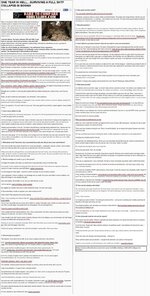Staff Member
Gold Lifetime
- Messages
- 21,834
- Reactions
- 63,224
Some months ago, I was in a voice meeting with, among a number of other individuals, the Commissioner of Financial Institutions in Puerto Rico. There were other government officials, at least one lawyer, management types, and IT professionals. I was one of the latter. The chief concern of, well, the chief of that organization was getting power running (and other supporting systems) to the banks so that the ATMs would function for the good citizens of said island.
And I've been reading everything I can get my hands on regarding a Cascadia subduction zone event. (In fact I'm still working on a resource guide/book review on that.) Such a disaster would be in a middle zone between a localized, short term disaster (think an earthquake in California or a hurricane in the South) and on the other end an event that would be the end of the world as we know it (TEOTWAWKI). In the former, currency is a great asset, in the latter the only real value is starting fires to keep warm.
Most sources indicate the power will be out for months in a large Cascadia event:
(Note: I'm not asking for specifics as to amounts, etc. I wouldn't answer that question, nor would I expect anyone else. We have preps along these along these lines, stored, secured, and hidden in different locations. That is as much as I would volunteer.)
And I've been reading everything I can get my hands on regarding a Cascadia subduction zone event. (In fact I'm still working on a resource guide/book review on that.) Such a disaster would be in a middle zone between a localized, short term disaster (think an earthquake in California or a hurricane in the South) and on the other end an event that would be the end of the world as we know it (TEOTWAWKI). In the former, currency is a great asset, in the latter the only real value is starting fires to keep warm.
Most sources indicate the power will be out for months in a large Cascadia event:
"Oregon's resilience plan, released in February 2013, estimates electrical service in Portland and surrounding areas will be knocked out for one to three months.
...
In tsunami-ravaged coastal areas it could be six months before power is restored to pre-quake levels." — Full-Rip 9.0: The Next Big Earthquake in the Pacific Northwest, by Sandi Doughton, Chapter 14
"Damage State High
Extensive damage to generation plants, substations, and buildings. Up to 20% of the generation plants have critical equipment damage. Up to 50% of critical substation equipment is damaged. Relays tripped in 75% of the substations. Up to 15% of the regional power transformers are damaged and non-functional. A significant number of distribution circuits are damaged and a large number of transmission lines are non-functional. Up to 20% of the substation control buildings are damaged and repairs are needed to regain functionality. Restoring power to meet 90% demand may take months to one year." — Exercise Scenario Document: Cascadia Rising, January 2015 (Emphasis added)
...
In tsunami-ravaged coastal areas it could be six months before power is restored to pre-quake levels." — Full-Rip 9.0: The Next Big Earthquake in the Pacific Northwest, by Sandi Doughton, Chapter 14
"Damage State High
Extensive damage to generation plants, substations, and buildings. Up to 20% of the generation plants have critical equipment damage. Up to 50% of critical substation equipment is damaged. Relays tripped in 75% of the substations. Up to 15% of the regional power transformers are damaged and non-functional. A significant number of distribution circuits are damaged and a large number of transmission lines are non-functional. Up to 20% of the substation control buildings are damaged and repairs are needed to regain functionality. Restoring power to meet 90% demand may take months to one year." — Exercise Scenario Document: Cascadia Rising, January 2015 (Emphasis added)
"Miyamoto [H. Kit Miyamoto, Ph.D., S.E] said. 'I wouldn't be surprised if the city [Seattle] is down for more than twelve month.' The same could be happen Portland and Vancouver." — Full-Rip 9.0: The Next Big Earthquake in the Pacific Northwest, by Sandi Doughton, Chapter 11
Questions to ponder:
- Do you have enough currency and related stashed for such length of time?
- While the US currency will still hold value outside of the disaster area (parts of the Pacific Northwest) have you considered barter items in the event greenbacks become less valuable?
- Have you pondered how basic economics (supply, demand, etc.) would change radically in such event?
(Note: I'm not asking for specifics as to amounts, etc. I wouldn't answer that question, nor would I expect anyone else. We have preps along these along these lines, stored, secured, and hidden in different locations. That is as much as I would volunteer.)












